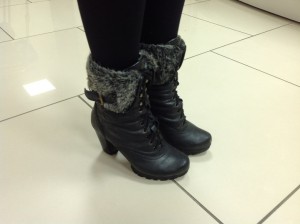6th March 2013
Others’ shoes
One of the skills a diplomat needs – or, at least, is very useful if they have it – is to understand people. How they think, their motivations, what affects their behaviour, and so on.
There is a saying in English that you should try to “put yourself in someone else’s shoes”. In other words, to imagine how others see the world, and how they would react to any particular event, action, or comment made about them.
Nowadays, we describe the understanding and sharing of the emotions of others as “empathy”. Empathy, in Russian, is “сопереживание” (saperejivaniye) and in Belarusian “суперажыванне”, (superajyvane) both of which translate literally as “co-experience” – a good summary of what empathy is about.
So, when others say that they do the same job as their colleagues but get paid less, then I can understand and feel their resentment.
Or that if they are attacked, but are not given the same help and protection as others, then I would want them to be properly protected, and have the same protection as those others.
Or that their bodies are subject to laws that others have decided upon, but which they have not agreed to or been consulted on. Then I would want them to be consulted and to agree how they should be treated.
That’s the essence of what is being discussed now in New York – in the 57th Commission on the Status of Women. The main themes are gender equality, tackling violence against women and girls, and sexual and reproductive health and rights.
Many of my British colleagues around the world have lobbied host governments on these issues. Indeed, other FCO bloggers have already written on this subject – on forced marriage, sexual violence and on the work of colleagues in Geneva, where much of the preparation for the Commission has taken place.
The Commission itself isn’t going to change immediately the status of women. But it sets a global benchmark for all nations to be judged against.
This year, Belarus is represented on the bureau of the Commission. Belarus – or more precisely, the Byelorussian Soviet Socialist Republic – was represented on the original Commission that was set up in 1946. The Commission contributed language to the 1948 Universal Declaration of Human Rights.
We have lobbied the government in Belarus on this subject. And we share much the same view. There are differences between the genders. But gender difference shouldn’t stop us from trying to give everyone the same opportunities, or treating each other equally, regardless of their gender.

Read between the lines and expressive messages gorgeous very creamy article
Rhetoric and expression of the finest art what can be
thanks
Ingo-Steven: thank you for your comments. Please don’t apologise. You’ve no need to.
Dear Bruce,
I ‘m verry sorry. But of course, correct is :”…you ‘ll stumple in my FOOTSTEPS…
Once again, Sorry!
BW, Ingo-Steven
“…if you try to walk in my shoes/ You ´ll make the same mistakes as I do /
You ´ll stumple in my fotsteps/ There too big for you, I bet/
So try to walk in my shoes….”
(Depeche Mode, Album “Violator”, 1998)
Dear Bruce , after I had read the 1st. chapter of your excellent report “Others` Shoes”, this older UK-Hit sounded immediately in my ears. After I had read your report completely, there are to two important fact as a result :
#1 : Thanks a lot for mentioning this “forced marriage & sexual violence ” link.
It helped me much. # 2 : Your last sentence or chapter: I think, that it ´s necessary and very important to lobby Belarus ´s government.So that there is a permament contact between you/the British Embassy and them.
Finally , I do very agree to you that we shouldn ´t stop to try to “give everyone the same chances”. REGARDLESS OF THEI GENDER. And pls. be so kind to allow me to add : Equal rights also to minority like gays or lesbians- disabled persons or older people. I know of what I ´m writing for I ´m gay and so-called “handicapped” too.
Best wishes, einen guten Wochenstart, hawyl faur,
Ingo-Steven Wais, Stuttgart/Wuerttemberg, Cardyygean/Cymru